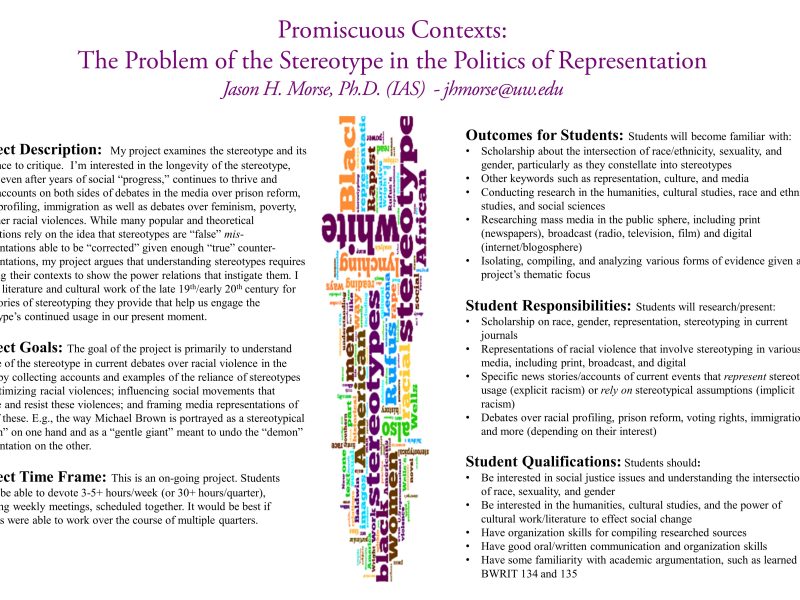Promiscuous Contexts: The Problem of the Stereotype in the Politics of Representation

My project examines the stereotype and its resistance to critique. I’m interested in the longevity of the stereotype, which, even after years of social “progress,” continues to thrive and frame accounts on both sides of debates in the media over prison reform, police profiling, and immigration as well as debates over feminism, poverty, and other racial violence. While many popular and theoretical conceptions rely on the idea that stereotypes are “false” misrepresentations able to be “corrected” given enough “true” counter-representations, my project argues that understanding stereotypes requires mapping their contexts to show the power relations that instigate them. I look to literature and cultural work of the late 19th/early 20th century for the theories of stereotyping they provide that help us engage the stereotype’s continued usage in our present moment.
The goal of the project is primarily to understand the role of the stereotype in current debates over racial violence in the media by collecting accounts and examples of the reliance on stereotypes in legitimizing racial violence; influencing social movements that critique and resist this violence, and framing media representations of both of these. E.g., the way Michael Brown is portrayed as a stereotypical “demon” on one hand and as a “gentle giant” meant to undo the “demon” representation on the other.
Student Outcomes:
- Scholarship about the intersection of race/ethnicity, sexuality, and gender, particularly as they constellate into stereotypes,
- Other keywords such as representation, culture, and media,
- Conducting research in the humanities, cultural studies, race and ethnic studies, and social sciences,
- Researching mass media in the public sphere, including print (newspapers), broadcast (radio, television, film) and digital (internet/blogosphere), and
- Isolating, compiling, and analyzing various forms of evidence given a project’s thematic focus.
Requirements:
- Be interested in social justice issues and understanding the intersection of race, sexuality, and gender,
- Be interested in the humanities, cultural studies, and the power of cultural work/literature to effect social change,
- Have organization skills for compiling researched sources,
- Have good oral/written communication and organization skills, and
- Have some familiarity with academic argumentation, such as learned in BWRIT 134 and 135
- Scholarship on race, gender, representation, stereotyping in current journals
- Representations of racial violence that involve stereotyping in various media, including print, broadcast, and digital.
- Specific news stories/accounts of current events that represent stereotype usage (explicit racism) or rely on stereotypical assumptions (implicit racism).
- Debates over racial profiling, prison reform, voting rights, immigration, and more (depending on their interest).
Time Commitment:
- This is an ongoing project. It would be best if students were able to work over the course of multiple quarters.
- Students should be able to devote 3-5+ hours/week (or 30+ hours/quarter), including weekly meetings, scheduled together.
